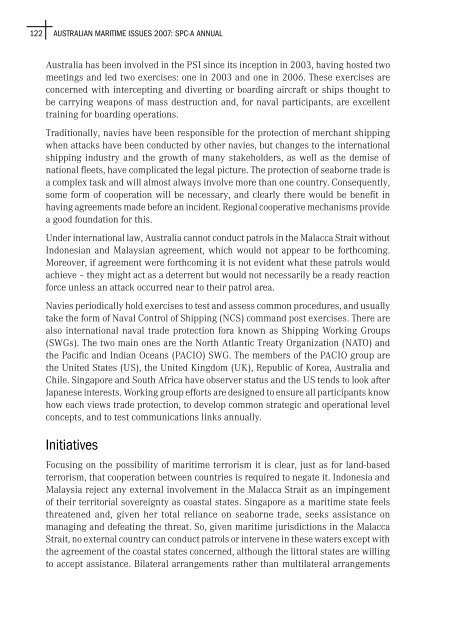Australian Maritime Issues 2007 - Royal Australian Navy
Australian Maritime Issues 2007 - Royal Australian Navy
Australian Maritime Issues 2007 - Royal Australian Navy
Create successful ePaper yourself
Turn your PDF publications into a flip-book with our unique Google optimized e-Paper software.
122 AUSTRALIAN MARITIME ISSUES <strong>2007</strong>: SPC-A ANNUAL<br />
Australia has been involved in the PSI since its inception in 2003, having hosted two<br />
meetings and led two exercises: one in 2003 and one in 2006. These exercises are<br />
concerned with intercepting and diverting or boarding aircraft or ships thought to<br />
be carrying weapons of mass destruction and, for naval participants, are excellent<br />
training for boarding operations.<br />
Traditionally, navies have been responsible for the protection of merchant shipping<br />
when attacks have been conducted by other navies, but changes to the international<br />
shipping industry and the growth of many stakeholders, as well as the demise of<br />
national fleets, have complicated the legal picture. The protection of seaborne trade is<br />
a complex task and will almost always involve more than one country. Consequently,<br />
some form of cooperation will be necessary, and clearly there would be benefit in<br />
having agreements made before an incident. Regional cooperative mechanisms provide<br />
a good foundation for this.<br />
Under international law, Australia cannot conduct patrols in the Malacca Strait without<br />
Indonesian and Malaysian agreement, which would not appear to be forthcoming.<br />
Moreover, if agreement were forthcoming it is not evident what these patrols would<br />
achieve – they might act as a deterrent but would not necessarily be a ready reaction<br />
force unless an attack occurred near to their patrol area.<br />
Navies periodically hold exercises to test and assess common procedures, and usually<br />
take the form of Naval Control of Shipping (NCS) command post exercises. There are<br />
also international naval trade protection fora known as Shipping Working Groups<br />
(SWGs). The two main ones are the North Atlantic Treaty Organization (NATO) and<br />
the Pacific and Indian Oceans (PACIO) SWG. The members of the PACIO group are<br />
the United States (US), the United Kingdom (UK), Republic of Korea, Australia and<br />
Chile. Singapore and South Africa have observer status and the US tends to look after<br />
Japanese interests. Working group efforts are designed to ensure all participants know<br />
how each views trade protection, to develop common strategic and operational level<br />
concepts, and to test communications links annually.<br />
Initiatives<br />
Focusing on the possibility of maritime terrorism it is clear, just as for land-based<br />
terrorism, that cooperation between countries is required to negate it. Indonesia and<br />
Malaysia reject any external involvement in the Malacca Strait as an impingement<br />
of their territorial sovereignty as coastal states. Singapore as a maritime state feels<br />
threatened and, given her total reliance on seaborne trade, seeks assistance on<br />
managing and defeating the threat. So, given maritime jurisdictions in the Malacca<br />
Strait, no external country can conduct patrols or intervene in these waters except with<br />
the agreement of the coastal states concerned, although the littoral states are willing<br />
to accept assistance. Bilateral arrangements rather than multilateral arrangements
















